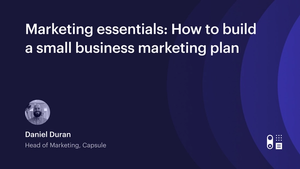Are you looking to welcome eager, ready-to-buy leads to your site and to your offering? If that's the case, it's time to add some inbound marketing solutions to your existing tool stack.
This article rounds up the top software to help your company attract and engage more visitors.
What are inbound marketing tools?
Inbound marketing tools are resources for attracting customers through content like blogs, videos, and social media posts. They focus on bringing people to you, rather than you having to go out and get their attention. What's more, they make it easier to connect with people who are interested in what you have to say or sell.
Why should you use inbound marketing tools?
There are multiple benefits to using them. Here are some of the greatest advantages:
1. Attract more visitors
The right inbound marketing tools boost your visibility online. More people see your website which means more potential customers.
2. Generate better leads
It's not just about getting leads - it’s about attracting new, quality prospects. With a solid inbound marketing strategy, you're more likely to draw in people who are eager and ready to engage with what you offer. Often these leads are problem-aware and actively looking for a solution.
3. Save time
Do you ever wish there were more hours in the day? While marketing automation can't stretch time, it can certainly free up more of yoursa bunch of it. Automate routine tasks like emails and social posts, and watch your schedule open up.
4. Increase efficiency
Why would you juggle ten things poorly when you could handle five brilliantly? With specialized solutions, you can streamline your efforts.
5. Track performance
Tools like Google Analytics are a treasure trove of data. This way, you can peek behind the curtain to see what's clicking with your audience and what's not.
6. Improve your SEO efforts
Search Engine Optimization is what makes your website rank on search engines like Google. The better your website is optimized, the higher you’ll rank. And higher rankings mean more people can find you organically so you can save time and money to spend on ads instead.
7. Enhance customer engagement
Keep your interactions with customers smooth and personal. Happy customers stick around longer and spend more money.
8. Coordinate campaigns
Do you have a lot on your marketing plate? An inbound marketing tool is your command center. It keeps you organized and on top of all your campaigns.
9. Educate your market
Have you ever heard the saying, "Teach someone to fish"? Through valuable, educational content, you're teaching your market why they need what you're selling. It builds trust and positions you as the go-to expert.
10. Stay ahead of competitors
Using the latest tools puts you ahead of the curve and a step ahead of the competition. It’s about being quick to adapt and innovate, so you stay fresh and relevant in your industry.
Top inbound marketing software tools in 2024
If you want to take advantage of all these perks, you need proper solutions. Below you'll find our rundown of the best inbound marketing tools out there in the following areas:
- Customer Relationship Management (CRM)
- Search Engine Optimization (SEO)
- Content management
- Social media
- Email marketing
- Building language pages
Let's take a closer look at each of these.
CRM systems
With CRM systems, you can keep track of all your customer interactions in one place. It's easy to see everything from initial contact to final sale. As a result, nurturing relationships and keeping people coming back is simple.
Capsule CRM
Capsule CRM is an online tool that helps you build stronger customer relationships, streamline your sales process, and save time. It's known for its simple yet powerful features that cater to businesses looking to grow and optimize their customer interactions.
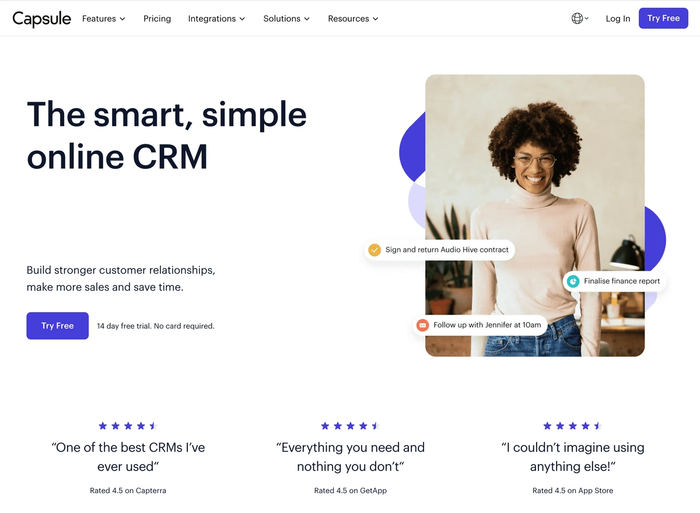
Key features
- Contact management: Keep all your customer information in one spot. Track conversations, understand customer history, and personalize your interactions.
- Sales pipeline: Customize your sales pipeline to reflect your processes, identify critical deals, and increase your win rate.
- Sales analytics: Gain insights into which activities boost your sales and use data to make smarter business decisions.
- Workflow automation: Automate routine tasks for a better sales process.
- AI Content Assistant: Write emails quickly with Capsule's AI technology
Pros of Capsule CRM
- User-friendly interface that makes navigation and operation straightforward.
- Integrates seamlessly with popular tools like Gmail, Outlook, and Mailchimp.
- Robust analytics that pinpoint impactful sales activities.
- Free tool version available.
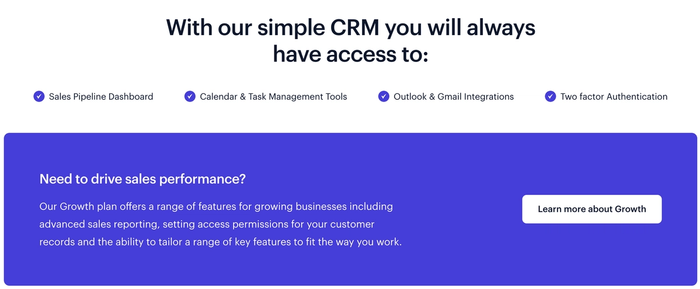
User reviews
"Capsule has revolutionized our business, allowing us to add key company information in one place and make it available to everyone within the business. We took it on as a CRM to help manage company contacts, but it's now become an always-on product used for project management tool, where we track projects, calls and actions, as well as an event planner, where we have set up reminder tracks so we can ensure company events run smoothly." Jeremy H.
"Capsule has a very good interface that is very intuitive. It works well with my business process and with the pipeline and project elelments, it helps keep on track of all the client engagements I have. I have a multifaceted business that covers physical products, consultancy and full-scale management."Steve L.
"Firstly, it's incredibly intuitive and easy to use, even for someone who's not particularly good with technology! I started my business 13 years ago and was introduced to Capsule by my son (a web designer) who said it would be perfect for me to run my business, I use it every working day and I've not been disappointed. I love the way it integrates with FreeAgent and Microsoft Outlook. It's a breeze to navigate and implementing actions and tasks and the customer support is second to none. I mainly use 'Opportunities' and 'Tracks' and I love the 'Tags' feature. I literally couldn't imagine running my business without it." Boze D.

Best for
Businesses of all sizes are looking to properly manage customer relationships and simplify sales operations without the complexity of traditional CRM systems.
Pricing
In addition to the free plan, Capsule offers a tiered pricing model that meets different business sizes and needs, from startups to established enterprises. It's worth checking out the plans to find which suits you best You can also trial each plan for free for 14 days to get a real taste of what Capsule can offer.
SEO tools
SEO is a key instrument used in inbound marketing. SEO keyword research tools help you find the best ideas to use, offer suggestions for website optimization, and climb up those search rankings. It’s like they give your website a megaphone on the internet.
SurferSEO
SurferSEO is a cutting-edge tool used for SEO tasks. Use it to improve your rankings in search results, boost brand visibility, and drive organic traffic. This is all possible using a comprehensive, easy-to--follow SEO workflow.
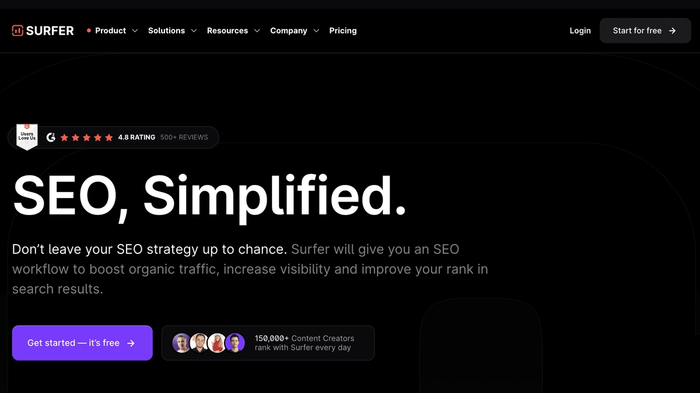
Key features
- Content editor
- Plagiarism checker
- SurferAI
- Content score
- SEO audit
Pricing
SurferSEO offers a 7-day free trial to explore its features. After the trial, various pricing plans are available.
SEMrush
SEMrush is a platform that supports your online marketing efforts. It covers SEO, content marketing, competitor analysis, PPC, and social media marketing - all from one central location
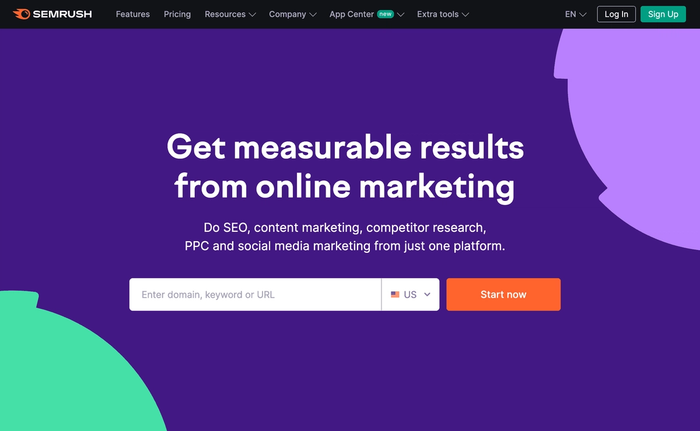
Key features
- Keyword research tools
- Content gap and analysis tools
- Content marketing
- Market research
- Advertising
- Agency solutions
Pricing
SEMrush is equipped with a few pricing plans, good for different needs and budgets. There’s also a free trial, so you can test the waters before committing to a subscription.
Ahrefs
Ahrefs can give you everything you need to get more traffic and rank high in search engines. This all-in-one SEO solution crawls the web to provide you with insights on improving your website's visibility.
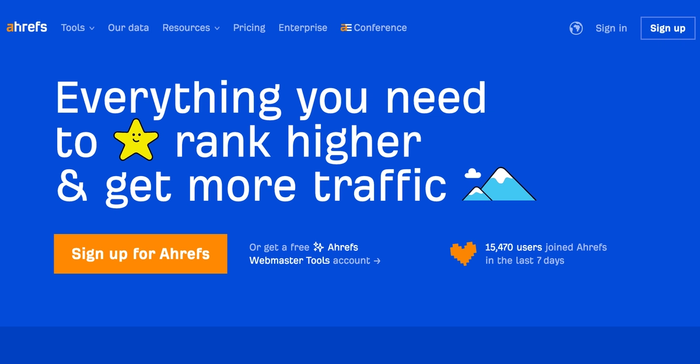
Key features
- Site explorer
- Site audit
- Keywords explorer
- Content explorer
- Keyword rank tracker
Pricing
Ahrefs offers four pricing plans.
- Lite: $129/month
- Standard: $249/month
- Advanced: $449/month
- Enterprise: custom pricing
They also have a free limited version with access to some tools for those starting out or with minimal needs.
And while we’re on the subject, why not check out these 7 ways to use CRM to boost your SEO strategy?
Content management systems (CMS)
Thanks to a CMS, managing your website doesn't require you to have a tech wizard onboard. It’s a space to create, manage, and modify content on your site. And if it's easy to use, you can keep your site looking fresh with minimal fuss.
WordPress
WordPress's robust platform lets you design and manage your own website or blog. It’s packed with features to customize your site just the way you want.
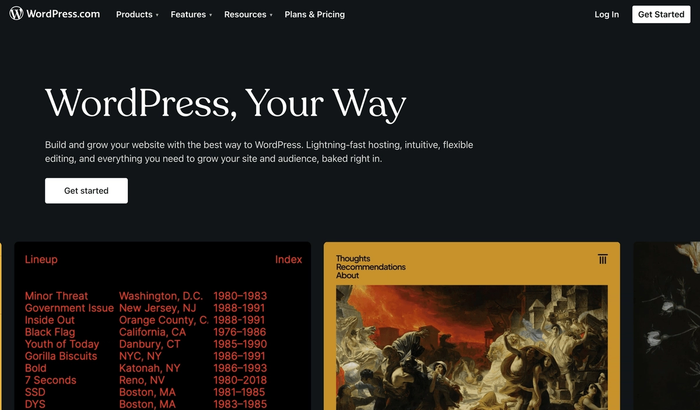
Key features
- WP hosting
- Domain names
- Website builder
- Professional email addresses
- Commerce tools
Pricing
Here's a breakdown of the plans at WordPress.
- Free: limited features with WordPress branding
- Personal: $4/month, best for personal use
- Premium: $8/month, suitable for freelancers
- Business: $25/month, great for small businesses
- Ecommerce: $45/month, ideal for online stores
Wix
With Wix, anyone can have a professional website. Whether you're starting a blog, opening an online store, or showcasing a portfolio, Wix provides all the tools you need to design a website that stands out.
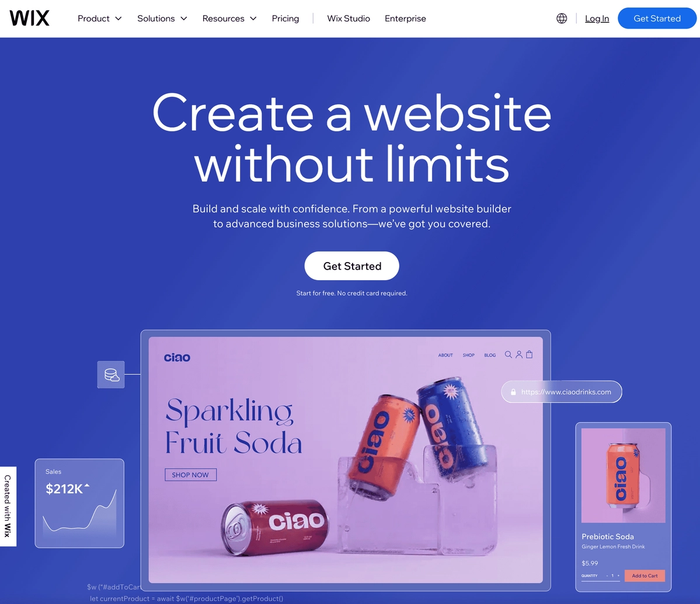
Key features
- Intuitive drag-and-drop editor
- Customizable website templates
- Advanced SEO tools
- Mobile optimization
- Ecommerce solutions
Pricing
There's a basic version available for free. Paid plans include additional features. You can pick one from the following configurations:
- Combo: for personal use at $14/month
- Unlimited: for entrepreneurs and freelancers at $18/month
- Pro: complete online branding at $23/month
- VIP: first priority support at $39/month.
Wix also has Business and ecommerce plans starting at $23/month, ideal for accepting online payments and growing your online store.
Squarespace
Squarespace is a popular website-building platform known for its sleek design templates and user-friendly interface. Users can craft professional-looking websites through simple drag-and-drop tools. There are a bunch of features for everything from blog creation to ecommerce store management.
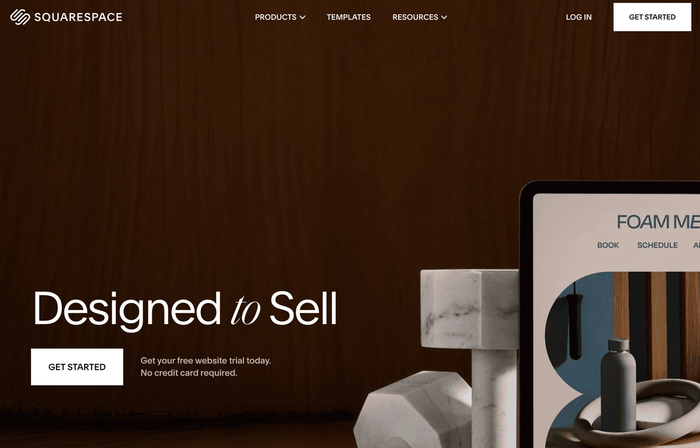
Key features
- Website templates
- Drag-and-drop website builder
- Built-in SEO tools
- Comprehensive ecommerce solutions
- Mobile-optimized design
Pricing
Squarespace has four pricing plans:
- Personal: for simple websites at $12/month (billed annually)
- Business: for small businesses and professional sites at $18/month (billed annually)
- Basic Commerce: for new online stores at $26/month (billed annually)
- Advanced Commerce: for online stores seeking growth with the help of advanced features at $40/month (billed annually)
Social media management tools
Social media can be tricky to manage. But with these tools, it’s a breeze. Schedule posts, track engagement, and analyze what’s working and what’s not. Think of it as having a control center for your social media activities.
Kontentino
With Kontentino, you can take care of anything related to planning, approval, scheduling, and analysis of content across multiple social media platforms. Their platform cuts out the chaos and offers strategic control to agencies, brands, and freelancers alike.
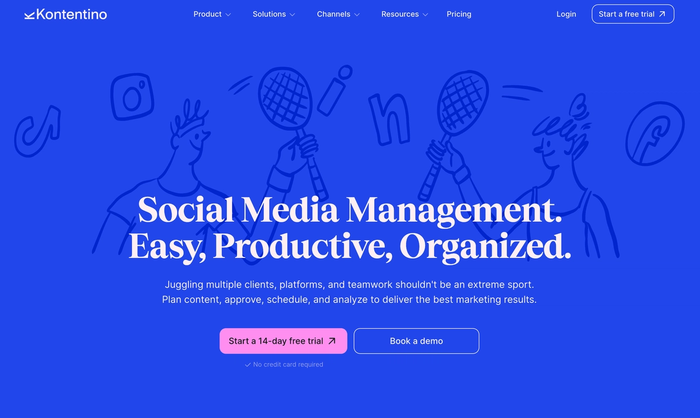
Key features
- Intuitive planning calendar
- Client approval workflows
- Post scheduling
- Real-time collaboration
- Analytics and insights
Pricing
Kontentino's pricing is based on your team size and specific needs. There's a 14-day free trial with no credit card required to test the platform before committing to a subscription.
SocialPilot
If you want to streamline the scheduling, planning, and analysis of social media content, SocialPilot is a popular solution.
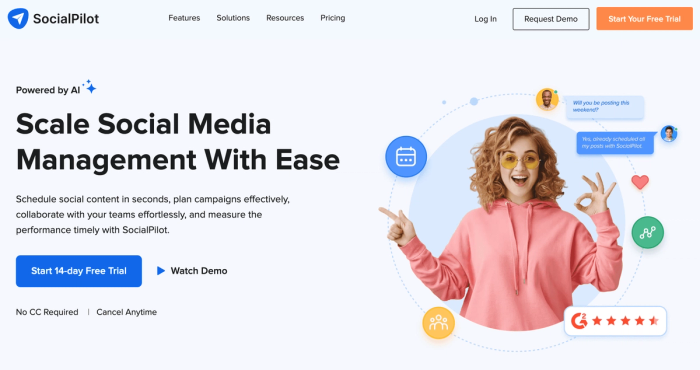
Key features
- Social media scheduler
- Content calendar
- AI assistant
- Bulk scheduling
- Analytics and reporting
Pricing
With SocialPilot, there are several pricing plans:
- Professional: for small teams or individual professionals;
- Small Team: with more features, it’s suitable for growing teams;
- Agency: appropriate for agencies needing advanced functionalities and more client accounts;
- Enterprise includes the features mentioned above as well as customizations, consultations and a service-level agreement.
Each plan starts with a 14-day free trial.
Email marketing software
Email marketing software helps you send flawless, targeted emails that don’t end up in the spam folder. Customize templates, manage your mailing lists, and track your email campaign performance.
Transpond
Transpond is an easy to use marketing platform that helps you grow your prospects with forms, create standout communications and keep track of your campaign performance, all from the comfort of an intelligent but straightforward interface.
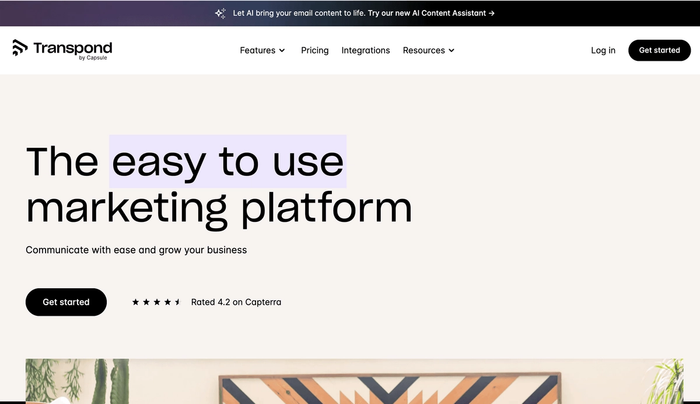
Key features
- Campaign builders
- Signup forms
- Marketing automations and transactional emails
- Advanced analytics and website Tracking
- AI content assistent
- Integrates with platforms and tools like social media, CRMs and more.
Pricing
You can create an account with Transpond for free, using a reply tracking mailbox on their 'Freemium' plan. Their paid plans are as follows:
- Essentials: $10/month (billed annually). This is the most affordable plan offering everything you need to simply send campaigns, including multiple reply tracking mailboxes, web tracking and automation.
- Professional: $20/month (billed annually). Professional includes everything from the Essentials plan at a greater scale, plus split tests and custom template blocks.
- Premium: $89/month (billed annually). Premium includes everything you'll need to manage an effective email marketing plan.
Click to learn more about Transpond's pricing plans.
Instantly.ai
Instantly.ai is a dynamic email outreach platform. With Instantly, you can add unlimited email accounts and automate warmup processes with a B2B lead database to scale your outreach efforts.
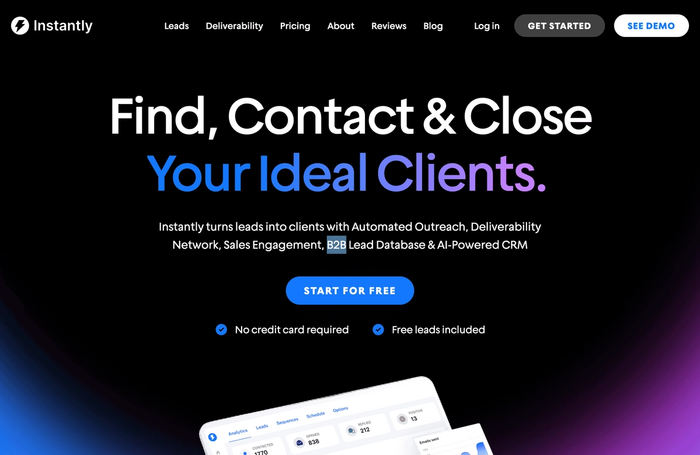
Key features
- Unlimited email accounts
- Email warmup
- B2B lead database
- Generative AI
- Inbox management
Pricing
Instantly has a freemium model, meaning you can start using their platform for free with basic features. For advanced functionalities, premium plans are also available.
Landing page builders
Landing page builders are excellent solutions for creating tailored web pages. Thanks to them, you can appeal to new visitors reaching your site through organic search listings and ads.
GetResponse
With GetResponse, you can build landing pages, forms, and popups that catch your visitors' attention and convert them at the right time. And thanks to the analytics features, you can see which visitors turn into real customers.
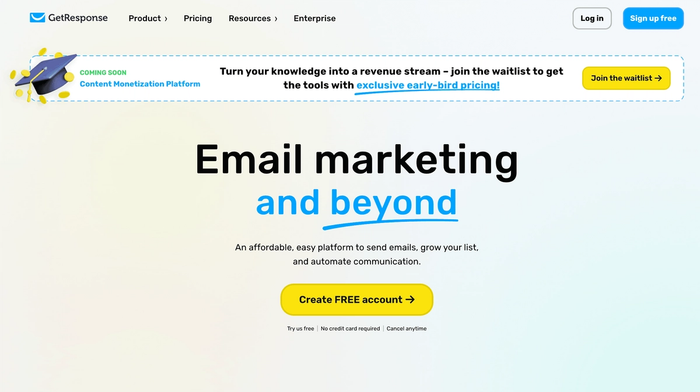
Key features
- Landing pages
- Page performance analytics
- SEO tools
- Professional domain
- Popups and forms
Pricing
It's free for 30 days, then you'll have to pick one of the paid plans. Prices vary between $14 and $700 per month.
Unbounce
Unbounce is a leading platform for creating and optimizing landing pages. It uses AI technology to build pages and personalize user interactions to improve conversion rates - and users don’t need extensive coding experience either.
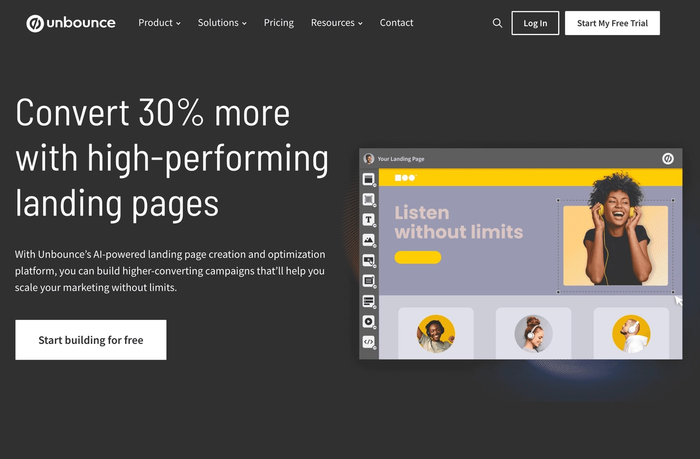
Key features
- Drag-and-drop builder
- A/B testing
- AI optimization
- AI copywriting
- Popups and sticky bars
Pricing
Unbounce offers a 14-day free trial. After that their plans range from $99 to $649 per month.
Now that we’ve covered different types of inbound marketing tools, let’s look at how you should go about finding the best ones for you.
Where to look for inbound marketing strategy solutions?
Blogs and industry websites
Start with industry-specific blogs, such as Capsule's. They break down complex marketing tactics into digestible pieces, with articles on the latest trends in email marketing, social media management, and much more.
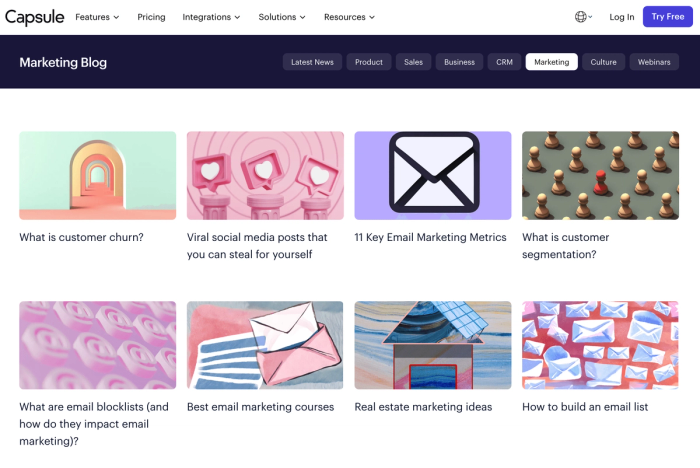
Software review sites
Head over to software review sites like Capterra or G2. These platforms give you insights from real users on what works best. They cover everything from marketing automation platforms to specific inbound marketing tools. These review sites also enable you to compare features and read real user experiences.
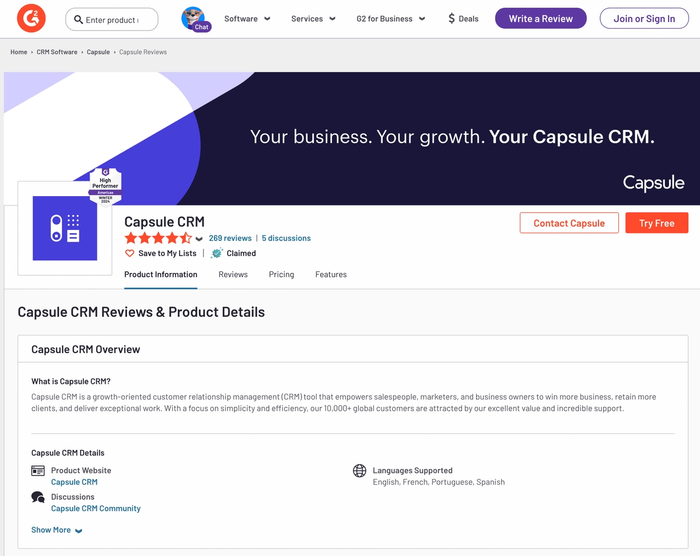
Recommendations from peers
Sometimes a recommendation from a friend in the industry can point you to great inbound marketing strategies and tools. Networking events, online forums and LinkedIn groups are also fantastic to get tried-and-tested advice. Stronger Together is an example of a networking community that offers advice and support to their peers.
Social media platforms
Platforms like X and LinkedIn are not just for social media marketing. They’re also rich with ongoing discussions about inbound marketing efforts. Following thought leaders and joining relevant groups can give you fresh strategies.
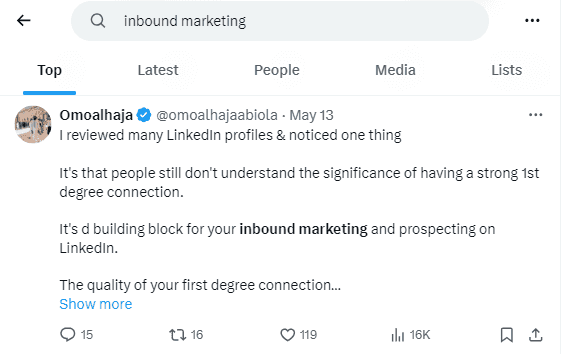
How to get insights from inbound marketing tools
Using the best inbound marketing tools can reveal useful insights to improve your inbound strategy and drive engagement. But putting those insights into action can be difficult at first, as it requires understanding how to make data work for your goals.
Here are four ways to apply these insights:
Improve email marketing with tailored messaging
Are you struggling with low open rates and engagement on your emails? Getting the data from your inbound marketing platforms can reveal exactly what resonates. Analyze open rates, click-through rates, and top-performing subject lines to determine what best engages your audience.
For example, if a promotional email featuring a customer success story receives high engagement, use similar storytelling techniques in future emails. This approach refines email marketing content to match what potential customers want to read and respond to.
Equip your marketing and sales team with targeted follow-ups
Insights from inbound marketing efforts can reveal which content prospects engage with most.
For instance, if a lead spends time on a page about product features, the sales team can reference them in follow-up calls or emails and make their outreach more relevant. This tailored approach helps the sales team connect with leads on topics they already show interest in.
Enhance social media posts based on engagement data
Popular marketing automation platforms track social media engagement metrics, like peak engagement times and preferred content formats. If data shows that interactive posts – such as polls or questions – gain the most traction at specific times, use this insight to schedule similar posts when engagement is highest.
Refine inbound methodology with ongoing feedback
A strong inbound methodology improves as you learn what works. Review metrics from your marketing automation software, such as search engine optimization performance and conversion rates on landing pages.
For example, if certain blog topics consistently draw organic traffic, create additional content in those areas to fine-tune your effective inbound marketing strategy.
Wrapping up
Now you're ready to create great inbound marketing campaigns. With these tools, you can easily attract, engage, and convert your target audience.
Each solution discussed has special features that help with different parts of your marketing mix, like creating content, managing social media, and acquiring leads. Whether you use Capsule for your CRM tasks, GetResponse for its email marketing strengths, or Unbounce for making landing pages that convert well, the above tools can be mixed and matched for effective marketing unique to your business.
Why not trial any of Capsule’s plans for free for two weeks to see the difference a simple but powerful CRM can make to your business.
Frequently Asked Questions
Inbound marketing is important because it attracts a target audience through valuable content and keyword research, fostering trust and engagement. Unlike outbound marketing, this strategy naturally pulls prospects in, leading to higher quality leads and conversions.
Sales teams benefit from using an inbound marketing tool because it streamlines lead generation and qualification. Marketing tools like CRM systems and marketing automation boost productivity, helping teams align with their inbound marketing strategies for better results.
Marketing automation enables businesses to streamline inbound marketing campaigns. By automating repetitive tasks such as email workflows, lead nurturing, and social media posting, marketers ensure consistent engagement with the target audience throughout the entire inbound marketing process.
Effective inbound marketing strategies include content creation, SEO through keyword research, social media marketing, and lead nurturing. These inbound marketing tactics focus on attracting, engaging, and delighting a target audience while complementing a broader inbound marketing methodology.
Inbound marketing software helps manage inbound marketing campaigns and tactics, including marketing automation, SEO, social media, and analytics. These tools enhance keyword research, optimize content delivery, and ensure alignment with the overall inbound marketing approach.
The inbound marketing technique focuses on attracting prospects through valuable content tailored to the target audience. Through strategies like content creation, keyword research, and marketing automation, it converts visitors into leads without relying on outbound marketing tactics.
The five principles of inbound marketing include attracting, engaging, converting, nurturing, and delighting the target audience. By focusing on content, marketing automation, and inbound marketing tactics, companies create meaningful connections and long-term customer loyalty.
Inbound marketing is a strategy where businesses attract their target audience through content, SEO, and social media rather than interruptive outbound marketing. For example, a blog post optimized with keyword research and shared via an inbound marketing tool attracts leads by addressing their specific needs.




